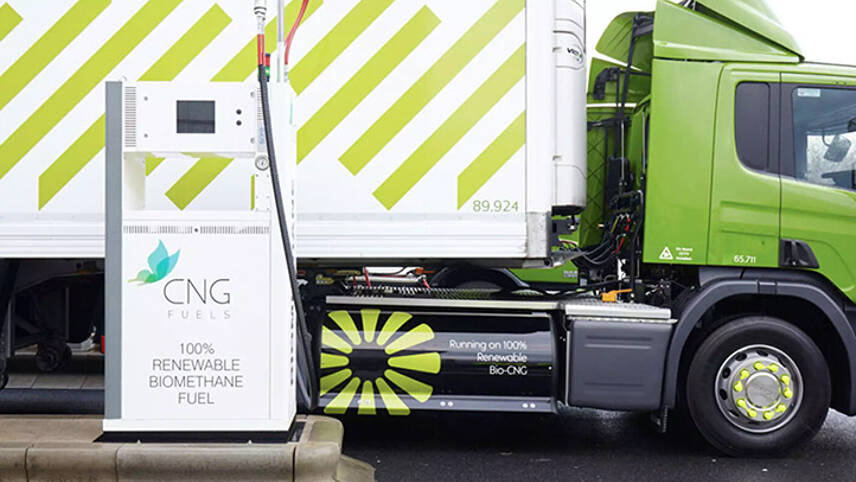This premium content is exclusive to edie Members.
To find out more about edie Membership, please click below.
If you are an existing member, login here

At a glance
Who: The John Lewis Partnership
What: Biomethane station for HGVs
Where: Aylesford, Kent
Why: To provide a low-carbon solution for HGV fleets
When: Constructed started in August 2023
The challenge
HGVs account for more than 4% of the UK’s total carbon footprint, but aren’t often suitable for other transport decarbonisation methods such as electrification due to their size. If the UK is to meet its net-zero goal, and retailers operating HGVs want to hit key sustainability targets, alternate decarbonisation methods are required.
The solution
Renewable biomethane – derived from food waste and manure by ReFuels – is a low-carbon and cost-effective alternative fuel to diesel that is commonly used by HGVs today. In a bid to scale access and demand for biomethane, John Lewis is partnering with the provider to create a large-scale refuelling station.
How the project works
The station in Aylesford is a joint venture between CNG Fuels, the infrastructure arm of ReFuels, Foresight Group, a sustainability-led investment management company and the John Lewis Partnership.
The station, which started construction week commencing 21 August 2023, gives HGVs a central hub to refuel with a low-carbon alternative to diesel. The site serves major UK trunk routes including the M20 and M2, and is being built on land acquired by ReFuels from the John Lewis Partnership adjacent to Waitrose’s southeast distribution centre.
This location will enable the retailer to grow its fleet of low-carbon HGVs. John Lewis now operates more than 400 biomethane-powered HGVs. It has operated these vehicles since 2015
The station will be capable of fuelling more than 500 trucks per day with biomethane sourced from ReFuels. The site features 12 fuel pumps capable of delivering 19 million kg of Bio-CNG annually.
ReFuels has one other station under construction in Bangor, North Wales, which is due to start operations in September 2023. At least two further stations are expected to commence construction this calendar year.
By 2026, the company aims to have 30-40 stations in operation with a total capacity of up to 15,000 HGVs refuelling per day and more than 600 million kg of biomethane dispensed annually, equivalent to cutting UK HGV CO2 emissions by 8%.
Other fleet operators will be able to access the refuelling station.
The results
The station is expected to help John Lewis save almost 60,000 tonnes of CO2 a year compared to conventional diesel powered HGVs. More broadly, the biomethane provided by ReFuels can cut emissions by 90%.
Existing data from biomethane HGVs managed by John Lewis Partnership has confirmed that they generate around one-fifth of the carbon dioxide of traditional diesel HGV models.
Business benefit
As the retailer works to increase that number to 520 by 2028, it is co-investing in several pieces of refuelling infrastructure, including ReFuels’ new refuelling station in Aylesford, Kent. John Lewis Partnership notably hosts its distribution centre for the South-East nearby.
The company’s goal is to fully convert its HGV fleet to biomethane by 2028. This forms part of a wider goal to end the use of petrol and diesel vehicles in the group by 2030.
Additionally, zero-emission HGVs are now exempted from paying the HGV levy, provided they are emission-free at the tailpipe and would also be otherwise exempt from vehicle excise duty (VED). This exemption does not extend to hybrid vehicles.
Under the UK’s net-zero target for 2050, an ambition is in place to end the operation of HGVs which are not zero-emission by 2040.
Investment/savings
ReFuels states that its biomethane solution can provide a 40% reduction in fuel costs over the lifetime of the project.
Industry context
Demand for Bio-CNG from fleet operators is growing rapidly. In July alone, 3,799 tonnes of Bio-CNG was dispensed across CNG Fuels’ stations, equivalent to an 80% increase compared to the same period last year. In addition to the John Lewis Partnership, ReFuels supports over 80 other major fleets switching to Bio-CNG including Aldi, Amazon, DHL, Lidl, Royal Mail, and Warburton’s.
The latest project will add to the company’s existing network of 12 refuelling stations across the UK. In total, this network can refuel more than 6,000 HGVs daily, saving more than 750,000 tonnes of CO2 emissions compared to diesel.
© Faversham House Ltd 2024 edie news articles may be copied or forwarded for individual use only. No other reproduction or distribution is permitted without prior written consent.

